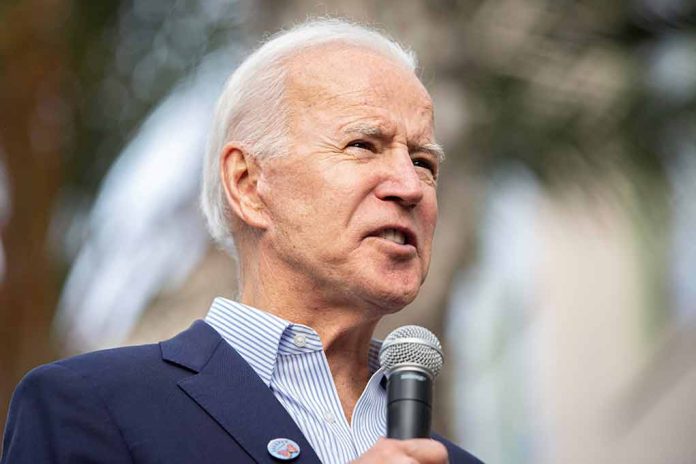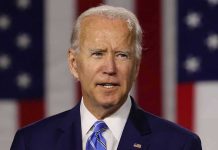
As contract negotiations between dockworkers and port operators reach a critical juncture, the Biden administration maintains a watchful stance without direct intervention, raising concerns about potential economic disruptions.
At a Glance
- International Longshoremen’s Association (ILA) threatens to halt work at 36 US ports on October 1
- ILA demands a new six-year contract with $5 per hour annual wage increases
- East and Gulf Coast ports handle 53% of U.S. apparel, footwear, and accessories imports
- Biden administration adopts hands-off approach to negotiations
- Potential strike could disrupt holiday shopping season and overall supply chain
Looming Strike Threatens US Ports
The International Longshoremen’s Association (ILA) is poised to halt work at approximately three dozen US ports from Maine to Texas if a new contract isn’t reached by September 30. This potential work stoppage threatens to disrupt nearly half of America’s ocean cargo imports, raising alarm bells for citizens concerned about economic stability and supply chain integrity.
The ILA is demanding a new six-year contract with a $5 per hour annual wage increase, citing inflation’s impact on workers’ ability to cover living expenses. Currently, top-scale port workers earn a base pay of $39 an hour, with some making over $200,000 annually including overtime. The union’s initial demands included a staggering 77% pay raise over six years.
US President Joe Biden does not intend to invoke a federal law to prevent a port strike on the East Coast and Gulf of Mexico if dockworkers fail to secure a new labor contract by an Oct. 1 deadline, an administration official said https://t.co/6aJBUhvmS7
— Reuters (@Reuters) September 17, 2024
Biden Administration’s Hands-Off Approach
Despite the looming threat of a major economic disruption, the Biden administration has adopted a hands-off approach to the negotiations. This stance has drawn criticism from various industry groups and lawmakers who are urging direct intervention to prevent a potential crisis.
This hands-off approach has left many industry leaders concerned about the potential fallout. Republican lawmakers have urged President Biden to use all available authority to maintain the flow of goods if a strike occurs, highlighting the critical nature of the situation.
Economic Impact and Industry Concerns
The potential strike poses significant risks to various sectors of the US economy. In 2023, East and Gulf Coast ports handled 53% of all U.S. apparel, footwear, and accessories imports, valued at over $92 billion. Industries such as furniture, automotive parts, semiconductors, and medicines are particularly vulnerable to a port shutdown.
“In 2023, the East and Gulf Coast ports accounted for 53 percent of all U.S. apparel, footwear and accessories imports, amounting to over $92 billion in value,” wrote AAFA president and CEO Steve Lamar.
Retailers and industry groups have expressed deep concern about the strike’s potential impact on the holiday shopping season and overall supply chain. Many are warning that if a strike occurs, businesses “will only be able to do so with massive delays and at exorbitant cost” if they can get their products to market at all during the critical holiday shopping season.
Assume the Biden-Harris administration will be feckless and refuse to confront labor and the strike goes forward.
Should I be liquidating my stock holdings in anticipation of the unexpected recession? https://t.co/a7eX1qTUBM
— (((tedfrank))) (@tedfrank) September 23, 2024
Preparation and Contingency Plans
In response to the looming threat, shippers have been preparing by shipping goods earlier and shifting cargo to West Coast ports. This preemptive action, while necessary, has the potential to cause increased congestion and backlogs at these alternative ports.
Ports themselves are implementing contingency plans, including extended gate hours and additional operational days, in preparation for a potential work stoppage. However, these measures may not be sufficient to mitigate the full impact of a prolonged strike.
As the September 30 deadline approaches, all eyes are on the negotiations between the ILA and the United States Maritime Alliance (USMX). With no further talks currently scheduled and the union president warning of a strike if demands are not met, the situation remains tense and unpredictable. The outcome of these negotiations will have far-reaching consequences for the US economy and consumers alike.
Sources:
- AAFA Calls on Biden to Intervene in East Coast Port Talks
- White House monitoring US port talks, considering supply chain impacts
- Biden administration won’t intervene as imminent East Coast strike looms
- White House Monitoring US Port Talks, Considering Supply Chain Impacts
- Dockworkers at key U.S. ports threatening strike consumers could feel
- Republicans Urge Biden-Harris Administration Action to Prevent Strike at East and Gulf Coast Ports














